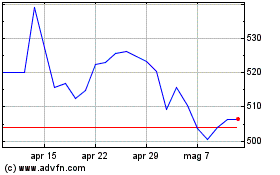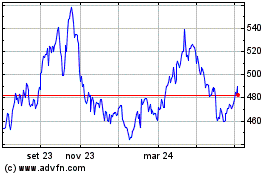The Next Wave in Shareholder Activism: Socially Responsible Investing
08 Marzo 2020 - 3:29PM
Dow Jones News
By Corrie Driebusch
The biggest activist hedge funds are jumping on the wave of
socially responsible investing.
Elliott Management Corp., known for waging campaigns for share
buybacks and executive change, suggested in its recent public
letter to Evergy Inc. that the utility consider reducing its carbon
footprint. In its February letter to management at Prudential PLC,
Third Point LLC highlighted the excessive carbon footprint it says
is created by having a London headquarters for the British
insurer's American and Asian businesses. And Jeff Ubben, an
activist known for nudging companies to focus on what they are best
at, has bought into BP PLC as a vote of confidence in the British
oil giant's plan to eliminate most of its carbon emissions.
In the latest trend in shareholder activism, the firms are
adding to their standard list of demands improvements in companies'
environmental, social and governance, or ESG, practices.
ESG represents a big opportunity -- and challenge -- for
investors.
Individual investors have moved billions of dollars into funds
that prioritize issues like sustainability and diversity, and the
activists are hoping to tap into that stream of cash.
Meanwhile, the largest institutional investors, including
BlackRock Inc. and Vanguard Group, have emphasized their commitment
to these issues. Earlier this year, BlackRock, which manages about
$7 trillion, said it is divesting itself of thermal coal producers
held in actively managed portfolios, adding that it will likely
vote against management and boards of companies that don't disclose
how climate change could hurt their businesses.
Highlighting ESG could help activists win the support of the big
funds that is crucial to their success -- and ignoring the issues
could make their backing harder to win. BlackRock, Vanguard and
State Street Corp. collectively hold roughly a fifth of the S&P
500 through funds they run for investors, so their influence is
essential in most activism campaigns.
The activists who are emphasizing ESG say it is an extension of
their focus on corporate governance. In the past decade, the
investors largely shifted away from demanding capital
redistribution, positioning themselves instead as advocates of
improving governance shortcomings.
"ESG is so top-of-mind right now throughout the investment
world, but with the exception of board diversity, we have yet to
really see the E and S be the center of an activism campaign," said
Andrew Freedman, a lawyer at Olshan Frome Wolosky LLP who works
with activists. "In the next year, we believe we'll see campaigns
where those factors are front and center."
Critics say the firms aren't pivoting out of a desire to save
the world, and to be sure, their ultimate goals remain the same:
higher stock prices and, in many cases, bigger payouts to
shareholders.
"Activists will try to co-opt what index funds care about," said
Avinash Mehrotra, global head of activism defense at Goldman Sachs
Group Inc.
It is far from guaranteed that the efforts will yield more
assets or better returns for a group that has struggled to keep up
with the surging stock market in recent years.
Jana Partners LLC has delayed its goal of launching a new
vehicle focused on ESG after it found more demand for case-by-case
partnership investments with an ESG thrust, according to a person
familiar with the matter. Jana was an early mover in activist ESG,
pushing Apple Inc. to address concerns about teenage iPhone
addiction in 2018 in partnership with the giant union California
State Teachers' Retirement System, or Calstrs.
Other activists haven't gone out of their way to talk about
environmental or social failings at the companies they target, with
some saying it is not their place to do so. Carl Icahn and Jeff
Smith of Starboard Value LP rarely incorporate such complaints in
their campaigns. Mr. Icahn hasn't managed outside money for years
and much of Starboard's capital comes from investors who likely
aren't pressing for such moves.
That contrasts with the likes of Elliott and Third Point.
Elliott made Christine O'Brien, a former research analyst at the
fund, head of investment stewardship last year, while Third Point
carved out a similar role for firm veteran Elissa Doyle.
And earlier this year, Mr. Ubben, a founder of ValueAct Capital
Management LP, officially stepped down from his role as chief
executive to focus on managing the firm's $1 billion socially
responsible Spring Fund.
Other funds that have taken into consideration environmental and
social issues, include Barington Capital Group LP, which has a
formal ESG policy. Its campaign at L Brands Inc. centered on
pushing the Victoria's Secret parent to break up, and it criticized
the fashion icon as "tone deaf," given women's current views of
beauty, diversity and inclusion. Ultimately, in a nod to such
criticism, L Brands added two new female directors, and in February
embattled founder Leslie Wexner agreed to step down as chairman and
CEO.
Write to Corrie Driebusch at corrie.driebusch@wsj.com
(END) Dow Jones Newswires
March 08, 2020 10:14 ET (14:14 GMT)
Copyright (c) 2020 Dow Jones & Company, Inc.
Grafico Azioni Bp (LSE:BP.)
Storico
Da Mar 2024 a Apr 2024

Grafico Azioni Bp (LSE:BP.)
Storico
Da Apr 2023 a Apr 2024
